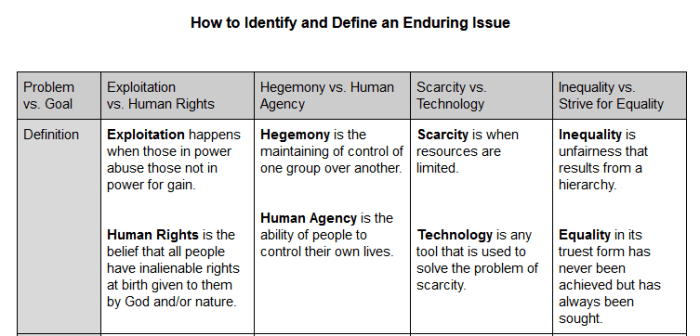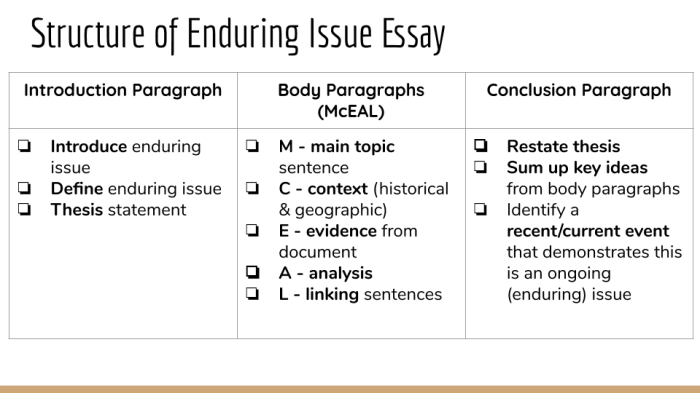Welcome to the enduring issues essay answer key, your ultimate resource for navigating the complexities of enduring issues essays. This comprehensive guide will provide you with the tools and insights you need to excel in analyzing and writing about these timeless topics.
Enduring issues are those that have persisted throughout history and continue to resonate with us today. They touch upon fundamental human experiences and challenge us to grapple with complex questions about society, justice, and the meaning of life.
Identify and Define Enduring Issues
Enduring issues, also known as timeless or perennial issues, are fundamental human concerns that transcend specific contexts and time periods. They are recurring themes that have occupied the minds of philosophers, writers, and thinkers throughout history.
Recognizing and understanding enduring issues is crucial for effective essay analysis because they provide a framework for examining and interpreting literary works, historical events, and contemporary social problems. By identifying the enduring issues that underlie a text or situation, we can gain a deeper understanding of its significance and relevance to the human condition.
Examples of Enduring Issues
Some common examples of enduring issues include:
- The nature of good and evil
- The meaning of life and death
- The struggle between freedom and determinism
- The relationship between the individual and society
- The search for truth and knowledge
Examine the Historical and Cultural Context
Enduring issues are often rooted in historical events and cultural norms. Understanding the historical and cultural context in which these issues arose is crucial for gaining a deeper perspective on their nature and significance.
Past Events
Historical events can shape the way we perceive and address enduring issues. For example, the experience of slavery in the United States has had a profound impact on racial inequality, which remains an enduring issue today. Similarly, the Cold War shaped global politics and security concerns, which continue to influence international relations.
Beliefs and Values
Cultural beliefs and values also play a significant role in shaping enduring issues. For instance, the belief in individual rights and freedoms has been a driving force behind the fight for civil liberties and human rights. Conversely, cultural values that prioritize collective interests over individual rights can lead to different perspectives on issues such as privacy and freedom of speech.
Specific Examples
- Racial Inequality:The legacy of slavery and discrimination in the United States has contributed to the persistence of racial inequality in various aspects of society, including education, employment, and criminal justice.
- Climate Change:Cultural beliefs about the importance of economic growth and the role of human activity in the environment have influenced the debate on climate change and the development of policies to address it.
- Religious Freedom:The tension between religious freedom and the separation of church and state is an enduring issue shaped by historical conflicts and cultural beliefs about the role of religion in society.
Analyze Different Perspectives

Enduring issues are complex and multifaceted, attracting diverse perspectives and interpretations. Understanding these varying viewpoints is crucial for comprehensive analysis and informed decision-making.
Different groups or individuals approach enduring issues based on their experiences, values, beliefs, and interests. These perspectives shape how they perceive the issue, identify its causes, and propose solutions.
Historical and Cultural Context
Historical and cultural contexts significantly influence perspectives on enduring issues. Past events, societal norms, and cultural traditions can shape individuals’ understanding of the issue and their preferred approaches.
Political and Economic Ideologies
Political and economic ideologies also play a role in shaping perspectives. For example, individuals with conservative ideologies may prioritize tradition and stability, while those with liberal ideologies may emphasize individual rights and social progress.
Social and Cultural Groups
Social and cultural groups, such as ethnic, religious, or socioeconomic groups, can have distinct perspectives on enduring issues based on their shared experiences and values.
Personal Values and Beliefs, Enduring issues essay answer key
Personal values and beliefs can also shape individual perspectives on enduring issues. For instance, those who value compassion may prioritize social justice, while those who value efficiency may emphasize economic growth.
Recognizing and understanding these diverse perspectives is essential for fostering constructive dialogue, finding common ground, and developing effective solutions to enduring issues.
Evaluate Evidence and Arguments
Evaluating evidence and arguments is crucial for understanding and addressing enduring issues. It allows individuals to critically assess the validity and reliability of information, identify biases, and make informed decisions.
Identifying Credible Sources
To evaluate evidence, it is essential to determine the credibility of the source. Consider the following factors:
- Author’s Expertise:Check the author’s credentials, affiliations, and previous publications in the field.
- Source’s Reputation:Assess the reputation of the publication, website, or organization publishing the information.
- Objectivity:Determine if the source presents a balanced perspective or exhibits biases.
- Transparency:Examine if the source provides clear references, citations, and evidence to support its claims.
Assessing the Validity of Information
Once the source’s credibility is established, evaluate the validity of the information itself. Consider:
- Evidence:Analyze the quality, relevance, and sufficiency of the evidence presented.
- Methodology:Examine the methods used to gather and analyze the data, ensuring they are rigorous and unbiased.
- Logical Fallacies:Identify any logical fallacies or biases that may undermine the validity of the arguments.
- Context:Consider the historical, cultural, and social context in which the information was produced.
Analyzing Arguments
To analyze arguments, assess their strengths and weaknesses:
- Soundness:Determine if the argument’s premises logically support its conclusion.
- Relevance:Examine if the evidence and reasoning are relevant to the issue being discussed.
- Counterarguments:Consider alternative perspectives and arguments that challenge the main argument.
- Implications:Analyze the potential consequences and implications of accepting the argument.
By critically evaluating evidence and arguments, individuals can gain a deeper understanding of enduring issues, make informed judgments, and engage in meaningful dialogue and decision-making.
Organize and Structure the Essay: Enduring Issues Essay Answer Key

Structuring an essay that analyzes enduring issues is crucial for clarity and coherence. A well-organized essay presents a clear thesis statement and supporting paragraphs that effectively address the issue from different perspectives.
Thesis Statement
The thesis statement is the central argument or claim of the essay. It should be specific, debatable, and supported by evidence. An effective thesis statement clearly states the issue, the author’s stance, and the main points that will be discussed in the essay.
Supporting Paragraphs
Each supporting paragraph should address a specific aspect of the issue and provide evidence and analysis to support the thesis statement. Paragraphs should be well-developed, with clear topic sentences that connect to the thesis and transition sentences that link paragraphs smoothly.
Consider using a logical progression in your supporting paragraphs, such as chronological order, comparison/contrast, or cause and effect. This helps readers follow the flow of the argument and understand the connections between different aspects of the issue.
Examples
- Essay Structure Example:
- Introduction with thesis statement
- Supporting paragraph 1: Historical context
- Supporting paragraph 2: Cultural perspectives
- Supporting paragraph 3: Different perspectives
- Supporting paragraph 4: Evidence and analysis
- Conclusion
Write Clearly and Effectively
In an enduring issues essay, clarity and effectiveness of writing are paramount. The essay aims to convey complex ideas and perspectives on timeless topics, and the writer’s ability to articulate these concepts clearly is crucial.Effective writing involves using precise language, avoiding jargon, and maintaining a consistent tone throughout the essay.
Precise language ensures that the reader understands the intended meaning without ambiguity, while avoiding jargon ensures that the essay is accessible to a wider audience. Maintaining a consistent tone helps the reader follow the flow of the essay and enhances its overall coherence.To
enhance the impact of the writing, the writer can employ literary devices such as metaphors, similes, and anecdotes. These devices can make the essay more engaging and relatable, allowing the reader to connect with the ideas on a deeper level.
Examples can also be used to illustrate abstract concepts and make the essay more concrete and understandable.
Q&A
What is an enduring issue?
An enduring issue is a topic that has persisted throughout history and continues to be relevant today, often addressing fundamental human experiences and societal challenges.
Why is it important to understand enduring issues?
Understanding enduring issues helps us make sense of the present by examining the past and considering different perspectives. It fosters critical thinking and informed decision-making.
How do I write an effective enduring issues essay?
To write an effective enduring issues essay, start by identifying the issue and its historical and cultural context. Analyze different perspectives and evaluate evidence and arguments. Organize your essay clearly and write with precision and clarity.